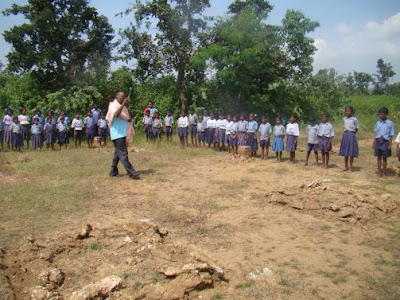Much
Obliged—Gratitude without Entitlement
Keynote
Address Delivered by William J. Byron, S.J
The Alumni/Father-Son
Communion Breakfast
St.
Joseph’s Preparatory School, Phiiladelphia, PA
Sunday,
February 24, 2013
Much
obliged, Father Bur; many thanks to you, Al Zimmerman and your associates who
honor me by an invitation to speak on this occasion. Much obliged St. Joe’s Prep; I’m grateful for the education I
received here and for the opportunity to speak today. Muck obliged, Prep alumni
and all you fathers and sons who gathered an hour ago in the great Gesu church
to “remember the Lord in the
breaking of the bread.” We meet now, after Mass, at
these tables to share both memories and a meal and celebrate the bonds of
brotherhood that bind us to the Prep. Much obliged!
You all
know what “much obliged”--that expression from the old American vernacular--means.
It says simply and directly, “Thank You.” That’s what we do every Sunday in
the Eucharist. That’s what Eucharist means—thank you—it is a thanks-saying, a
thanksgiving, a liturgical thanks-doing, that brings us all before the Lord
each week in gratitude as we express our thanks for the great gift of salvation
in Jesus Christ. And for that, we are indeed much obliged. At the Last Supper
Jesus said, in effect, to his disciples: This is how I want you to remember me—as bread broken and passed around, as a cup poured out. And
this is how I want you to relate to one another—as
bread broken for the nourishment of others, as a cup poured out in loving service.
Thanksgiving
Day is a great American tradition. It is a secular, not a religious feast day.
Thanksgiving, of course, puts the accent where it should be—on giving, saying, and doing thanks. Men and women of faith
target God first and foremost for expressions of gratitude when they celebrate
Thanksgiving Day; we Catholic Christians do this every day, particularly every
Sunday of the year. We Christians know where to look when we want to give
thanks!
Once we
put ourselves in the thanks-saying, thank-giving, thanks-doing mood, as we are
right now, it is a good idea to pay attention to a rising sense of entitlement
in America, especially among the young. And I would suggest to you today that
ingratitude is the infrastructure of entitlement.
Think
about that—ingratitude is the
infrastructure of entitlement, and entitlement is our cultural condition of
thinking we deserve everything we have. Entitlement prompts us to make demands,
not to give thanks.
Ignatius
of Loyola once remarked that “ingratitude is at the root of
all sinfulness.” He was on to something. When
ingratitude takes over one’s outlook, there is an erosion
of a sense of obligation, including moral obligation. “Much obliged” is a way the old American
vernacular had of saying thanks. If you have nothing to be thankful for—i.e., if you consider yourself to be entitled to everything
you have and might receive—you are unencumbered by a
sense of any obligation. You are free to be your selfish, solipsistic,
narcissistic self. Sadly, we notice a lot of selfishness and narcissism
surrounding us in America today.
Total
self-absorption is another word for sin. And remember, St. Ignatius of Loyola
saw ingratitude at the root of all sinfulness, of all self-absorption.
Fifteen
or twenty years ago, I found myself describing students I was then meeting in
the college classroom as characterized by a sense of entitlement. They thought
they “deserved” good grades, good health, good jobs, and the best of
everything the world had to offer. Cultural reinforcement for this attitude of
entitlement came, and continues to come, through their entertainment and
advertising, their words and music, their images and apparel. They have cures
for all their ills, protections from all dangers, solutions for all their
problems, answers (with or without the help of a search engine) to all their
questions. It is all within reach. It is theirs for the taking. No need to say
please. No need to say thanks.
This
outlook has seeped down into high school and middle school minds—to the teens and tweens who never say thanks. Good for you
if this is not typical of the way things are here at St. Joe’s Prep. The absence of a culture of entitlement here—if that indeed is the case--suggests the presence of a
faith-based culture of gratitude. If, however, you—any of you--are trapped in a culture of entitlement, you
have work to do.
Many
years ago I pressed a child for a working definition of the word “gift.” It was Christmas Day, in
fact, and she was my niece and we were gathered in the family room where gifts
and their wrappings had been strewn around all over the place. “What’s a gift?” I asked. “A gift is when somebody gives
you something,” this youngster said. And I
responded: “What if you had loaned me a
dollar last week and now I’m giving it back. Here, take
this dollar. Is that a gift? It fits your definition; you told me that ‘a gift is when somebody gives you something’ and, here, I’m giving you a dollar.” A moment’s pondering prompted the
youngster to revise her definition and say, “A
gift is when you get something you don’t deserve.”
How true.
How very appropriate for Communion Breakfast reflection. What a positive
indicator that we, through an awareness of gratitude, have a way of protecting
ourselves from the virus of entitlement. Life will be a good deal happier for
all if we realize that the gifts we get are not only undeserved, but, in the
Christian view of things, that they are symbols to remind us of the gift of
salvation to which none of us has a claim, except through our faith in Christ
Jesus the Lord.
Christ
has come. We are freed. All we can be is grateful. And because Christ has come
and traced out for us by his own words, and by the example of his life, what we
should value and how we should live, we can give a contemporary Christian
meaning to the compelling command given so many centuries ago by the Lord
through the prophet Michah: “What is good has been explained to you, O man [O woman];
this is what the Lord asks of you: only this, to act justly, to love tenderly, and
to walk humbly with your God” (Micah 6:8).
So let’s decide to be genuine men for others by acting justly in
all our relationships; by loving tenderly our family members and friends and
all those whom God puts within reach of our helping hand; and by walking
humbly, not arrogantly, but humbly and gratefully with our God—Emmanuel, who is “God with us,” Christ Jesus our Lord.
And let’s look upon our so-called Sunday obligation in terms of
gratitude. We gladly acknowledge ourselves to be much obliged to give praise
and thanks to God every Sunday. That’s what Sunday Mass is all
about. Not to do so would be to be an ingrate. And knowing how we personally
dislike ingrates, let’s resolve on this Communion
Breakfast Sunday to avoid being ingrates by being the Catholic Christians we’ve been called to be. That means regarding ourselves as
much obliged—much obliged to give praise
and thanks to God; much obliged to love one another as Christ loves us.
And
during the upcoming week--as next Sunday approaches--ask yourself: Am I an
ingrate? Or do I really consider myself to be much obliged? If so, get out to
Mass next Sunday, as you did today, and every Sunday—to express your gratitude.
So, once
again, St. Joe’s Prep, Father Bur, Al
Zimmerman, Alumni Association, Fathers and Sons—friends
all: Thanks you, gratias, much obliged, many thanks!

























